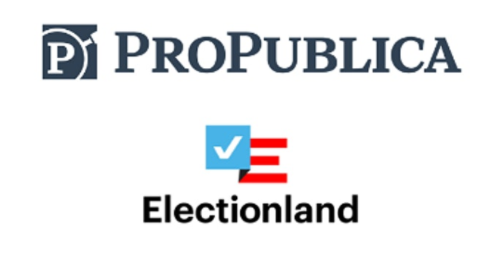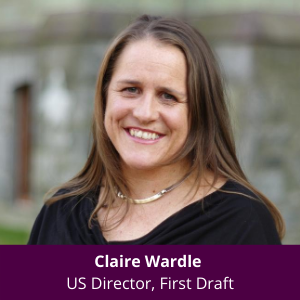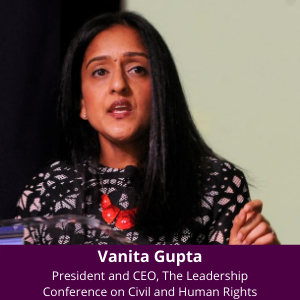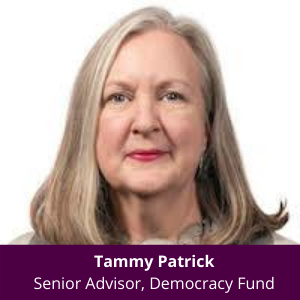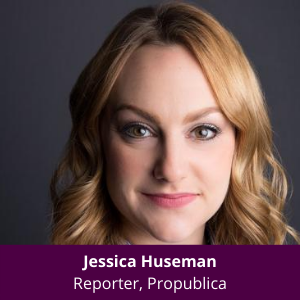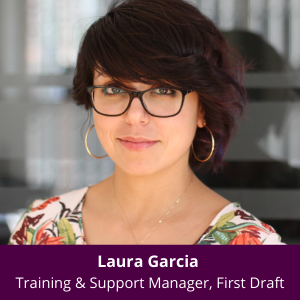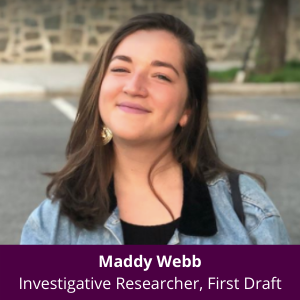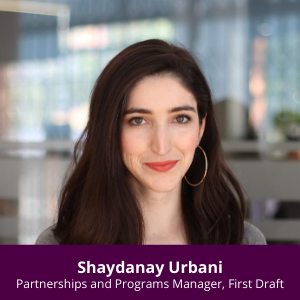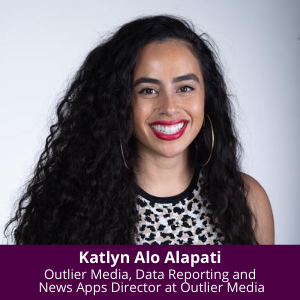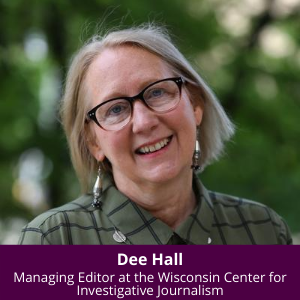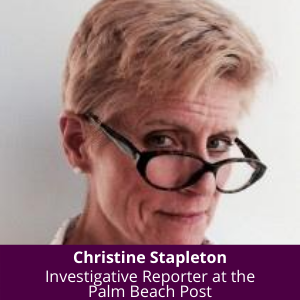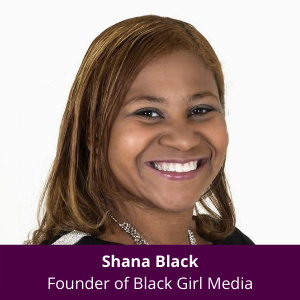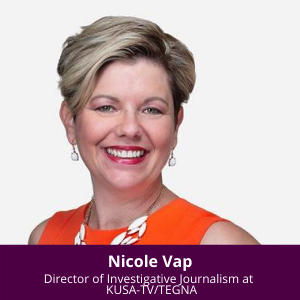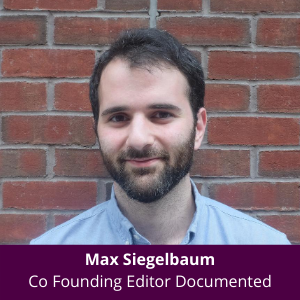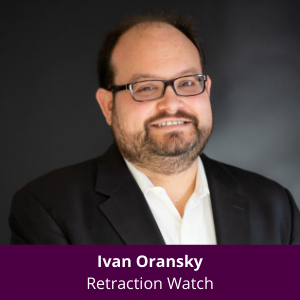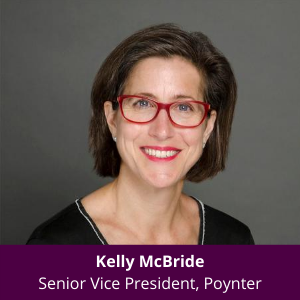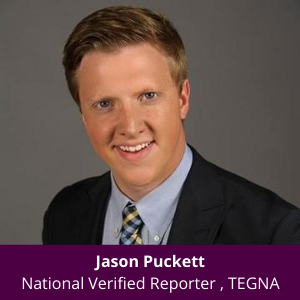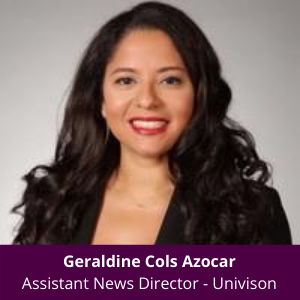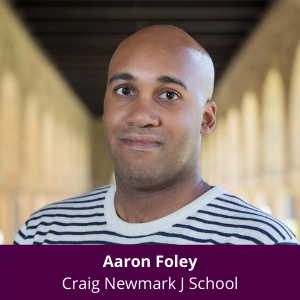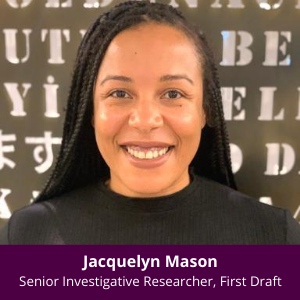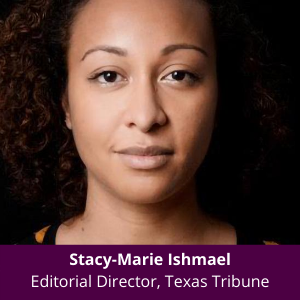About the event
Infotheque 2020 was First Draft’s inaugural virtual event to prepare journalists for covering election misinformation. We kicked off with a keynote and conversation between Civil Rights Attorney Vanita Gupta and First Draft’s US Director Claire Wardle, followed by our interactive Election Crisis Simulation. Two days of sessions covered digital investigation skills, how to think about local and “elite” misinformation, Facebook political advertising, election protection, and reporting on misinformation that targets Black and latinx communities. We closed the week with a talk from Texas Tribune Executive Editor Stacy-Marie Ishmael.
Who attended: Attendees represented local and national newsrooms and community organizations from across the United States. Our opening and closing keynotes had almost 350 viewers combined. Our other eight sessions averaged 55 attendees, with some of them bringing more than 70 people.

Sessions
Opening Keynote: Civil Rights Attorney Vanita Gupta in conversation with First Draft’s US Director Dr. Claire Wardle
Vanita Gupta and Claire Wardle discussed systematic voter suppression campaigns, the role of Facebook, and what journalists need to do to prepare for Election Day in the US.
Key takeaways:
- On Election Day, reporters should remember that secretaries of state all run their own elections, and they need to be given time to count their ballots. The impulse to call breaking news will be strong, but reporters should not make overestimates based on in-person votes.
- Even though mail-in voting is critical for this election, the reality is that for a lot of vulnerable voters, states need to preserve early in-person voting, and expand it as well.
- “This will be an election unlike any other,” Gupta said. Absentee and provisional ballots will come in higher numbers than ever before, and they must be counted. Journalists should write stories that help the public understand that giving time to count ballots is in fact democracy at work.
- On the role of social media: if Facebook and other platforms are interested in protecting free expression, Gupta said, they should enforce the policies they already have about voter suppression and incitement of violence, including when they come from politicians.
Election Crisis Simulation
Our crisis simulations are high-intensity events that place participants at the heart of an election disinformation campaign. Infotheque attendees were presented with a range of disinformation threats and challenged to make editorial decisions about how to report on them in real time.
Election Reporting in Unprecedented Times: keynote panel in partnership with ProPublica’s Electionland
Voter suppression is an issue every election year, and 2020 brings no shortage of reasons to believe this election season will follow suit. Covid-19 will transform the ways in which people participate in this year’s election. This Q&A with Jessica Huseman and Tammy Patrick covered how voter suppression works and what form it might take in November.
Key takeaways:
- Reporting on closing polling stations: It is important for reporters to toe the line between holding election administrators accountable and not scaring off voters. If polling places are being closed, find out why. Ask if the jurisdiction is tracking the reasons. Only sound the alarm once you’ve spoken to a number of people at the state and local levels. If people do not know why a polling location closes, it makes voters less confident in the system. If they do understand why, it gives them the opportunity to offer their facilities.
- On mail-in voting: There are more possibilities for delays this year than in previous years, but there are important ways reporters can keep the public informed. Learn how your local system works and explain to voters how mail-in ballots are processed—and why! Create explainers for voters about how to check whether their registration is current and how to request their ballots early. See if your state has ballot tracking, and explain that to audiences. This can boost voter confidence.
- Establish relationships of trust with election officials early and they will be more likely to communicate with you. Start meeting with local election administration now.
Finding your next story in social media political ads
Facebook’s political ad library can yield newsworthy local, state and national stories. In this session, researchers from the Ad Observatory and OpenSecrets.com presented templates for stories reporters can tell about money and politics using new tools that augment data from Facebook’s political ad libraries. They also shared tips about the common pitfalls of reporting on political advertising.
Reporting takeaways
-
Local reporters should consider investigating top spenders by candidate or unknown spenders in their states. Researchers Jeremy Merril and Anna Massoglia walk through how to do this.
-
Learn how to extract information about US Federal election candidates through their ads. Ad Observer is a chrome extension that collects ads that are shown to you on Facebook and YouTube. Reporters can gain access to their ad library dataset by contacting the project, based at New York Univeristy, at info@adobservatory.org. OpenSecrets.org is an online ad portal that maps spending across digital platforms by state and ranks top spenders.
Presented by: Anna Massoglia, Researcher, Center for Responsive Politics; Jeremy B. Merril, Researcher
Verification in your pocket: investigative tips for on-the-go reporting
Verification workshops can be filled with impressive, elaborate, and sometimes obscure tools for doing digital investigations that you can only use on a desktop computer. But what if you are out in the field or on the go? In this session we skipped the hi-tech software and presented our essential tips for verifying social content right from your phone.
Key takeaways:
- Our mobile toolkit is available for download here.
- Know where to find Facebook’s important features for investigating sources. When looking at pages, scroll down to find the “Page Transparency” section, which includes information about page history, administrators, and links to the political ad library. Also, look at the top of a page for a tab titled “Community.” This is sometimes hidden to the right of the “Posts” tab. It is a quick way to isolate all the posts on the page from external sources, which sometimes have elucidating information.
- The Twitonomy app is our favorite mobile app for investigating Twitter users. Use its “Tweets Analytics” function to look at who the account interacts with most, top hashtags, and other useful statistics.
Presented by: First Draft’s Laura Garcia, Madelyn Webb, and Shaydanay Urbani
How local newsrooms confront misinformation
Too often we talk about misinformation on the national or international level, with shady agents and foreign trolls taking center stage. But in the past year, misinformation has flourished in states and communities, and has transformed local elections. In this session, reporters from Michigan, Ohio, Florida, Wisconsin, and Colorado talk about how they confront misinformation in their states, and how collaboration can help journalists explain misinformation tactics and storylines to the public this election year.
Key takeaways:
- Listen to state-level insights from Colorado, Florida, Michigan, Ohio and Wisconsin on how newsrooms have been confronting misinformation.
- Learn how an information needs assessment revealed new questions on masks, treatments and daycare.
- Hear about the targeting of Dr. Acton, Ohio’s former Department of Health Director.
- See how Facebook groups such as Wisconsinites Against Excessive Quarantine spread misinformation, and the real-life consequences of conspiracies.
Presented by: Katlyn Alo Alapati, Data Reporting and News Apps Director at Outlier Media; Dee Hall, Managing Editor at the Wisconsin Center for Investigative Journalism; Christine Stapleton, Investigative Reporter at the Palm Beach Post; Shana Black, Founder of Black Girl Media and First Draft’s 2020 Local News Fellow in Ohio; Nicole Vap, Director of Investigative Journalism at KUSA-TV/TEGNA
Misinformation in Black and Latinx communities
Black communities are at the center of a national reckoning about racial justice. Latinx communities face uncertain policies and federal directives that sometimes affect immigration status and people in their lives. Black and Latinx communities have also been disproportionately affected by Covid-19. This panel talked about the unique ways these communities are vulnerable to misinformation and best practices on how to identify and respond to mis- and disinformation that targets these communities.
-
Understand the impact of the pandemic, protests, and elections while also recognizing the impacts of keyword squatting, a common tactic used by media manipulators.
-
Learn about the Goya boycott and the role bad actors played in exacerbating pre-existing tensions between Latinx and left vs. right wing communities.
-
Learn about how the killing of George Floyd brought defunding the police to the mainstream media, and how bad actors use Black Lives Matter values to spread disinformation.
Presented by: Aaron Foley, Newmark J School; Joan Donovan, Havard Kennedy School’s Shorenstien Center; Jacobo Licona, Equis Labs; Jacquelyn Mason, First Draft
Upending reliable sources: discerning who to quote and how
When misinformation comes from elected officials and institutions that journalists traditionally rely on for sources, it calls into question what exactly a reliable source is in the age of misinformation. This panel discussed how journalists can discern and confront misinformation when it comes from “authoritative” sources, and what criteria goes into a modern authoritative source.
Presented by: Claire Wardle, First Draft’s US Director; Max Siegelbaum, Documented; Ivan Oransky, Retraction Watch; Kelly McBride, Poynter; Jason Puckett, Verified, TEGNA; Geraldine Cols Azocar, Univision
Misinformation in your own backyard: regional insights
In conjunction with our Local News Fellows, First Draft did deep-dive research on local mis- and disinformation in Michigan, Ohio, Florida, Wisconsin, and Colorado. We shared our insights with reporters in these quick, state-level breakout sessions.
Evening Social with Stacy-Marie Ishmael
Our week ended with an informal conversation between Wardle and Editorial Director of the Texas Tribune Stacy-Marie Ishmael about local misinformation, how national news covers local stories, and what newsrooms should be doing ahead of the election. Ishmael is a veteran of BuzzFeed News, Financial Times, and Apple.
Key takeaways:
- On the challenge of normalizing uncertainty: The media industry has tried to overcorrect for misinformation so much that when people encounter uncertainty, Ishmael said, it’s only in bad faith ways. “Many journalists and most editors are extremely uncomfortable with not answering all the questions,” she said. Instead of having all the answers, Ishmael says she would love journalists to be perceived as the people with good questions—and for the media to embrace that role.
- On objectivity in news: “Only certain types of people are allowed to have biases,” said Ishmael. One issue is that the language that we use, says Ishmael, has built-in assumptions about whose opinions are “neutral.”
- On journalism and advocacy: if there’s a difference between journalism and activism, Ishmael said, it’s that “good journalism helps you understand the messiness,” while activism ties a tidier story together.
- At the Texas Tribune, Ishmael said they often talk about how national newsrooms are covering the “Texas story.” Her pet peeve: not attributing local reporters. “It’s almost as if we’re still litigating the wars of should-you-link or not-link”
- On reporting and mental health: “We have responsibility to go above and beyond as employers in a time of crisis.” Ishmael said everyone at the Texas Tribune had to take 10 days off between June and the election “I don’t know if we’ve reckoned with the emotional reality,” Ishmael said, of people who are dealing with racial injustice at the same time that we have upheaval in every possible category: unemployment, the election, mental health.
Speakers
(In order of appearance)
Partners
